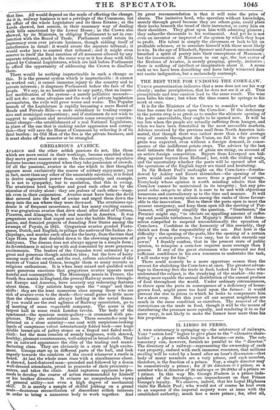GREGARIOUS AVARICE.
AVARICE and the other selfish passions do not, like those which are more social in their workings, become ennobled when they move great masses at once. On the contrary, their repulsive features become exaggerated when they take possession of crowds. Of all the passions, avarice is the one which to first thoughts appears most exclusively the source of solitary enjoyment ; yet in fact, more than any other of the unamiable emotions, it is found to derive augmented power from companionship and example. It is not to sympathy, but to emulation, that this is owing. The avaricious herd together and goad each other on by the stimulus of rivalry alone: they are jealous of each other—wasp- ish even in their cooperation. Avarice must have been the devil that entered into the herd of swine and urged them down the steep into the sea where they were drowned. The avaricious epi- demic is of frequent recurrence, and has many exciting causes. It was gregarious avarice that drew shoal after shoal of Corteses, Pizarros, and Almagros, to rob and murder in America. It was gregarious avarice that urged men into the bubble Mining Com- panies, and frenzied projects of founding New States among the swamps of Poyais, in 1825. Gregarious avarice goaded Portu- guese, Dutch, and English, to pillage the natives of the Indian Ar- chipelago, and murder each other for the booty, from the time that Cape Horn was first doubled down to the crowning massacre of Ambyona. The disease does not always appear in a simple form ; its feverishness is mixed up with and concealed by more generous excitements. The leaders of the Crusades were animated by a great and generous though mistaken idea ; but the love of booty among men of the sword, and the cool, callous calculations of the traders of Venice and Genoa, brought them as many recruits as religious enthusiasm. It is when least mixed and qualified with more generous emotions that gregarious avarice appears most hateful and contemptible. The Mississippi mania in France, the South Sea mania in England, the present Railway mania through- out Europe and America, have scarcely any redeeming features about them. City satirists harp upon the "stags" and their shifts: they are the least numerous class among those who are sick of avarice even to the death—their small game is little more than the chronic avarice always lurking in the social frame. If you would see the real ugliness of Railway speculation, go to al meeting of some respeetabk company. The scene is the largest hall in some crack London tavern. The body of the apartment—the spacious music-gallery—is crammed with pro- prietors. They are substantial men. Three moustaches may be detected on a close scrutiny—one coat with suspicious-looking lapels of sumptuous velvet ostentatiously folded back—one huge double breast-pin of paltry stones on a frayed and faded neck- cloth : but the mass consists of seemly burgesses, with shrewd, healthy, pleasant countenances, well-arrayed in broad-cloth. They are in outward appearance the elite of the trading and manu- facturing class. They are obviously in a state of high excite- ment. Groups start up in different parts of the hall, and look eagerly towards the outskirts of the crowd whenever a rustle is heard. At last the whole mass rises with a simultaneous cheer. A shrewd, bard-featured man—preceded and followed by a dozen well-dressed attendants, proud as peacocks of their proximity— enters, and takes the chair. Amid rapturous applause he pro- ceeds to develop the course of action recommended by himself or his brother directors. It evinces no comprehensive views Of general utility—not even a high degree of mechanical skill. It is merely a sample of skilful jobbing on a grand t.icale--dexterous reconciliation of discordant selfish interests in order to bring a numerous body to work together. And its great recommendation is that it will raise the price of shares. The imitative herd, who speculate without knowledge, merely through greed because they see others gain, could place their necks beneath the tread of their instructor, or carry him on their shoulders. They gloat upon him with admiring glances ; they subscribe thousands to his testimonial. And yet he is not even an inventor or improver of the system by which they hope to profit. His talent is simply the cleverness or luck to hit on profitable schemes, or to associate himself with those most likely to win. In the age of Elizabeth, Spenser and Jonson unconsciously breathed a spirit of poetry into their conceptions of Mammon ; but the incarnation of Mammon in our age, the last avatar of the Brahma of Avarice, is merely grasping, greedy, imitative ; there is nothing of intellect or imagination about it. A scene such as we have been describing and have lately witnessed does not excite indignation, but a melancholy contempt.


























 Previous page
Previous page